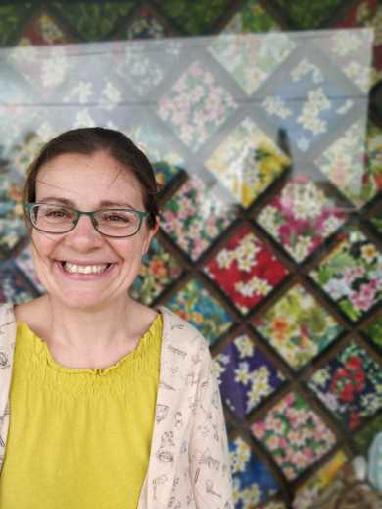
5 minute read
The Use of Social Media in Pregnancy and Early Parenthood
from AIMS Journal Vol 32 No 4 Social Media in Pregnancy and Early Motherhood
by AIMS (Association for Improvements in the Maternity Services)
Editorial
Advertisement
by Journal editors Katharine Handel, Luisa Izzi and Alex Smith
Katharine Handel Luisa Izzi Alex Smith


This year 2020 is drawing to a close and, for the most part of it, the Covid-19 pandemic seems to have brought almost the entirety of our lives online. But what happens when pregnancy and birth are brought online? With the pandemic, social media interactions during pregnancy and birth have become part of most people’s daily experience. However, the way in which social media has a presence – or dominance – in many aspects of pregnancy and birth is not new, in terms of both information sharing and connecting with others. Therefore, the theme of this issue, “The use of social media in pregnancy and early parenthood”, seemed to us new editors to be not only in need of exploring, but also extremely relevant in the present circumstances.
Interestingly enough, when we started reading around the topic, we found a really good overview in the book Taking the Village Online. Mothers, Motherhood, and Social Media.1 It was fascinating to witness how the articles we commissioned and received followed very closely the same three themes illustrated in the book! Social media can often influence our ideas of parenthood, and be a place, if not the place, where a lot of parents find support, information, and community. Social media also has a huge potential as a place “for resistance to cultural hegemonies”1, where we can voice our opposition to dominant ideas or practices. This seems particularly significant now, at a time when choices regarding pregnancy and birth have been severely reduced due to the Covid-19 pandemic.
I found that the following passage gives a good reflection of the findings of the stories told in this issue:
“Cyberfeminism’s central recognition of the Internet’s potential for women’s positive transformation begins with individual women connecting to a community of women online. […] With this sense of community and support, mothers can develop connections rooted in authenticity because they do not feel judged.”3
We are grateful to the authors for their focus on the ways in which social media impacts on people’s experiences at a critical time in their lives. The tension between the public and the private is addressed by Jocelyn Allen as she explores pregnancy and the transition to motherhood in her art and writing through the lens of social media. Jocelyn’s personal ambiguity reflects a broader more general theme
of social media as a mixed blessing. This is illustrated by Jen Culley and Liz Skidmore’s account of a very real and personal experience of regret following well-intentioned but misplaced support, sitting alongside Julie Wall’s moving account of the comfort she gained through her use of social media following a miscarriage earlier this year. The weighting of opinion was that social media is a force for good, with Gemma McKenzie attesting to the way that it allows women’s voices to penetrate obstetric debate more than ever before. However, Frances Attenborough tells a cautionary tale about the hidden forces at play in our use of social media, forces that may not always be to the benefit of the user. We loved the debate we enjoyed between ourselves on reading this article and we welcome your letters to the editor (editor@aims.org.uk)!
There is no debate about the way that social media has provided a lifeline for people during the Covid crisis. In her really helpful article, Jayne Joyce explains how she runs a successful closed group on Facebook that provides professional breastfeeding support, and Wendy Jones shares he experiences of supporting breastfeeding women with inflammatory bowel disease through her online forum. We must also thank Julie-Ann Crowley for bringing us up to date about the uses and benefits of the presence of AIMS on social media.
There is also a wealth of material from the AIMS Campaigns team. “Removing COVID-19-related maternity restrictions on partners” gives an update on AIMS’s response to this aspect of the pandemic, while “Refocussing our attention on Better Births” marks the fifth anniversary of the Maternity Transformation Programme by restructuring the Better Births vision in poetic form to encourage reflection and reassessment. Anne Glover provides an update on a pilot scheme in Northern Ireland to implement a continuity of carer model, while in “Ideological birth wars: The academic debate goes on, but where does this leave us?”, Jo Dagustun explores a recent controversial article published in the British Medical Journal about “where women should give birth” and includes a letter that she sent to the journal in response. There is an illuminating interview with Lorna Tinsley, who until recently provided a voice for midwives as a member of the Nursing & Midwifery Council, and Shane Ridley offers an analysis of “First Do No Harm,” the Independent Medicines and Medical Devices Safety Review chaired by Baroness Cumberlege in July 2020. “What Has the AIMS Campaigns Team Been Doing?” gives a roundup of the Campaign team’s activities over the past few months. Kay King introduces the Childbirth Choices Matter campaign, which aims to create a new insurance product for selfemployed professional midwives that is not tied to the premiums set by commercial insurance companies along with an access fund that will allow pregnant women and people to access this form of care if they choose. There is a briefing for birth activists on the new role of Professional Midwifery Advocate, and finally, we have two brilliant book reviews: one of Margaret Drabble’s feminist classic The Millstone, reviewed by Shane Ridley, and another of Mia Scotland’s Birth Shock, a compassionate treatment of the subject of birth trauma reviewed by Anna Madeley.
We would like to thank all the Trustees and Volunteers of AIMS for their warm welcome and their support as we got to grips with producing our first issue of the journal. Also, massive thanks go to Bonita Khan, Zoe Walsh and Josey Smith, who proofread this issue, and Danielle Gilmour, who uploaded all of the material to the website.
We hope you will enjoy reading this issue! For our March 2021 issue, we have chosen the theme of salutogenesis, or the origins of health, and will be focusing on factors that support human flourishing throughout the perinatal period, and beyond.
[1] Arnold, LB & Martin, A, eds. (2016). Taking the Village Online. Mothers, Motherhood, and Social Media. Bradford, Ontario: Demeter Press. [2] Arnold & Martin (2016), p.8 [3] Arnold & Martin (2016), pp.146–47





